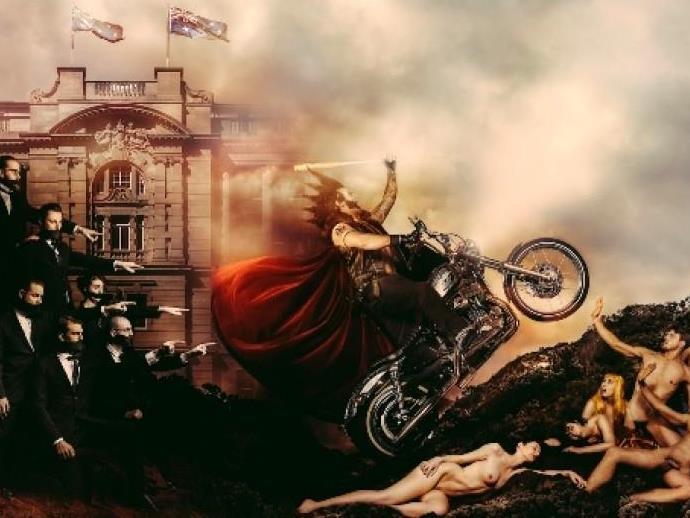Image by Vikk Shayen.
MKA: Bounty is a hilarious, incisive and absurd satire loosely based on the Premiership of Campbell Newman. Using the former Queensland premier as a sort of everyman for politicians across the country, the play questions and critiques a whole range of issues with the current political culture in Australia. Matching outrage with outrageousness, MKA presents its latest installment of confronting political theatre, continuing to instigate the conversations which it believes we as a nation should be having. Part roman gladiators, part Mad Max, part pineapples, MKA: Bounty is not to be missed.
The production opens on an idealised, Brady Bunch-esque version of the Newman family sitting down to dinner, grinning and wrinkling up their noses with self-satisfaction. Dinner is followed by a ‘game’ of press conference where Newman’s two daughters take turns interviewing their father, subtly providing background for anyone who is unfamiliar with details of the Premier’s career. You may find yourself trying to guess how much is parody and how much has actually been said by the leaders of this country as the narrative escalates. The cast deliver absurd performances with pantomime glee, without diminishing the scene’s resemblance to the stage-managed media appearances of politicians and their families that have become so omnipresent in today’s 24-hour news cycle.
The constructed quality of politicians’ media appearances are explored throughout the play as Director Tom Gutteridge appropriates a whole swag of politicians’ photo op tricks and press conference charades into the production. The Newman family frantically helps Campbell into and out of a series of familiar costumes, such as the high vis vest and construction hard hat which we have seen on so many politicians who pose for photos. The stage is littered with an array political rhetoric manifest, from the iconic Queensland pineapples to the Hills Hoist clothes line. Matilda Reed, playing Newman’s wife with surprising pathos, talks about a particular ‘wine red silk gown’ she is wearing and the media’s response. Melodramatic spot lighting and hypercoloured fills affect our view of the characters, literally portraying them in a tainted light.
Conor Gallacher is mesmerising as Campbell Newman and as slimy as a used car salesman, winking at imaginary fans and glad-handing audience members as if he were at a political rally. Drawing on a number of key political figures in his characterisation, Gallacher embodies idealised notions of mateship and larrikinism as he spouts all manner of bigoted slurs, demonises unions and attempts to justify his plan to imprison bikies in an arena-style superjail and have them fight like roman gladiators for the entertainment of the people of Queensland. The stark contrast between Newman’s jovial manner and the increasingly dark and deranged nature of the things he is saying highlights the horror of a man who genuinely believes he is doing the right thing.
There is no audience engagement per se and yet the audience is forced into an important role, even as that role is a passive one. We are made aware that we are sitting in silence while the population is drawn and quartered into cliches of good and bad, black and white; Australian, Queenslander, bikie, unionist, woman. The Newman family create an implied consensus of the shared views of ‘good people, people like us’ and the audience is made complicit in this consensus, in the white, middle-class ‘us’. The traverse staging positions the audience as the silent majority who share in the bigoted, illogical and at times paradoxical views of the protagonists. The Newman girls, dressed for some ballet class, smile and gesture to the audience as they chant parables echoing their father’s radically conservative rhetoric, demonising and dehumanising bikies, unions and other perceived enemies of freedom and Queensland. Newman’s smiles and winks superimpose an implied response onto the audience: we are welcoming his winks, we are returning his smiles. Canned laughter plays on behalf of the audience in response to Campbell’s jokes. We are swept up in the sound and fury of Newman’s vision and no space is left for response.
But there is a space for response. We must make a space for response. Throughout the play, the Newman family tells us again and again, ‘it will always, always be about you’ and this is the message we are left with. Put an end to the monologue. Start the conversation.
Written by Eric Gardiner
Directed by Tom Gutteridge
Cast: Conor Gallagher, Artemis Ionniades, Matilda Reed, Zia Zantis-Vinycomb
Melbourne Fringe Festival
Northcote Town Hall
16 September – 26 September, 2015





